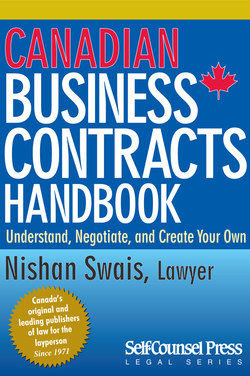Читать книгу Canadian Business Contracts Handbook - Nishan Swais - Страница 52
На сайте Литреса книга снята с продажи.
3.4 Anticipatory breach
ОглавлениеTo this point we have examined the remedies available in the case of an actual breach of a contract. By actual breach we mean that the breach occurs at the time performance is required under the contract. For example, if the final payment for the forklift is due on the 25th of the month and the buyer does not pay you on the 25th, then the buyer’s breach occurred at that time it was to be performed (i.e., the 25th of the month).
As we saw, where an actual breach occurs, the injured party may sue for damages following the breach (or, in rare cases, seek an order for specific performance).
What happens where a party breaches an obligation before it must actually be performed? For example, what if the buyer tells you on the 14th that he or she is not going to make the final payment by the 25th? Do you have to wait until the 25th to see if what he or she says will turn out to be true (i.e., if the buyer is actually going to breach)?
The law says no. It recognizes the existence of what is legally termed anticipatory breach and provides for a kind of self-help remedy for the injured party where the breach involves an essential term of the contract. Specifically, anticipatory breach of an essential term of a contract grants the injured party the right to cease performing its obligations under the contract without itself being considered in breach. What constitutes an essential term is dependent on the specific contract in question, so no definitive answer is possible.
By notifying you in advance that he or she will not be making the final payment for the forklift when it becomes due, the buyer has anticipatorily breached the contract. As a consequence, you can sue the buyer when the time for performance passes. Perhaps as importantly, you can also cease having to perform your obligations under the contract (i.e., because the obligation to pay for something is an essential term of a contract). For example, you may be required to deliver an owner’s manual upon final payment for the forklift. If that payment is not received, your obligation to deliver the manual no longer applies.
Needless to say, relying on another party’s anticipatory breach in order to cease having to perform yourself can be a tricky matter. The courts are filled with disputes about whether an anticipatory breach really existed and which party breached first. For example, the buyer acts contrary to what he or she said and actually pays you on the 25th. If you are not ready, willing, and able to deliver the manual at that time, then you will be the one in breach of your contractual obligation and may, as a consequence, find yourself on the wrong side of a lawsuit. The table will very quickly have turned. That is why you must exercise caution whenever you are intending to rely on an anticipatory breach in order to avoid your obligations under a contract.
